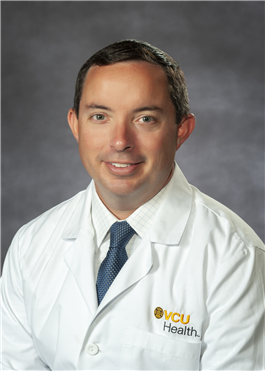Neuromuscular clinic, Neurology
Neurology, Neuromuscular Medicine, Neuromuscular Pathology
On the front lines of discovery for neuromuscular treatments
Dr. Nicholas Johnson treats adults and children with both common and rare neuromuscular conditions — yet his work doesn’t end in the clinic. He dedicates significant time each week to laboratory research, and is part of a team at VCU Health working to advance the treatment of genetic muscle disorders, with a special emphasis on muscular dystrophies.
“Disorders of the nervous system are complex, and require significant research to advance our understanding of them. I have a desire to better understand how diseases occur and how best to treat them,” says Dr. Johnson, who, in addition to his role at VCU Medical Center and the Children’s Hospital of Richmond at VCU, is Neuromuscular Division Chief in the VCU School of Medicine’s Department of Neurology.
In his clinical practice, Dr. Johnson treats conditions such as muscular and myotonic dystrophies, Charcot-Marie-Tooth disease, and a variety of other nerve and muscle conditions such as spinal muscular atrophy. “I want to not only provide patients with care, but also be the one creating treatments and therapies that could change their lives,” he says. In particular, the neurologist is excited about the development of gene-based therapies, which have revolutionized clinical trials over even the last few years. “We want VCU Health to be on the front lines of new developments to help our patients improve their lives.”
And as an important part of that treatment, Dr. Johnson says, is to have a comprehensive care team. He regularly sees his patients in our multidisciplinary clinics at the N.O.W. Center, Ambulatory Care Center, and CHoR. These clinics are home to physical and speech therapists, social workers, and other health professionals who work to provide the best possible supportive care alongside neurologists like Dr. Johnson.
In 2018, the Muscular Dystrophy Association awarded a $700,000 clinical research grant to Dr. Johnson to establish the Limb-Girdle Muscular Dystrophy (LGMD) Clinical Research Network. The work of the physician and his team will facilitate the development of tools and infrastructure needed to efficiently and effectively conduct clinical trials and accelerate treatments for LGMDs. This diverse group of disorders contains many subtype conditions, all of which include weakness and atrophy of the muscles around the hips and shoulders.
Dr. Johnson is board-certified in neurology, neuromuscular medicine and neuromuscular pathology by the American Academy of Neurology, and serves on its government relations committee.
Research interests
Dr. Johnson’s research interests include myotonic and muscular dystrophy, Limb-girdle muscular dystrophies, facioscapulohumeral muscular dystrophy, spinal muscular atrophy, and Charcot-Marie-Tooth disease. His research projects range from studies in congenital myotonic dystrophy to investigation in Limb-Girdle muscular dystrophy. He is also currently engaged in research projects in categories such as myotonic dystrophies and facioscapulohumeral muscular dystrophy.
Learn more about the Press Ganey survey
Learn more about the Press Ganey survey
In order to provide our patients and visitors with the most accurate and useful information, we only post physician satisfaction data when a physician has received a minimum of 30 returned surveys. For this provider, we have not yet received the minimum.
When asked what he’d like people to know about him, Austin Clayton’s response leaves no doubt about his positive outlook: “I can go pretty fast in this thing, really fast,” he points out, referring to his self-propelled wheelchair which he’s sometimes issued speeding tickets for in school. Since he figures people will wonder why he’s in his chair, he’s open to sharing this too: “I have limb-girdle muscular dystrophy. That’s why. And I want to be treated like anyone else.”

